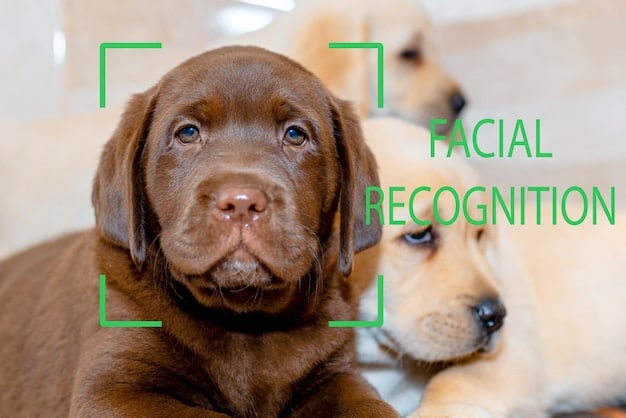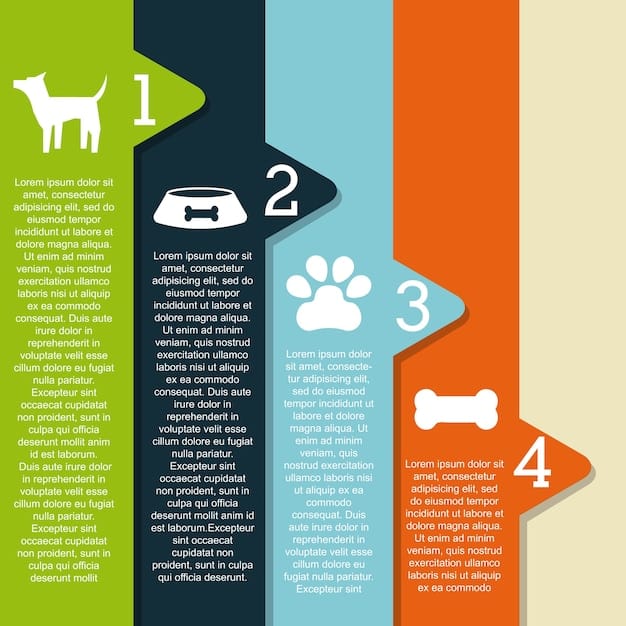Dog DNA Tests 2025: Accuracy Review of Top Brands

Dog DNA tests can offer insights into your pet’s breed and health, but a 2025 review of leading brands reveals varying degrees of accuracy, underscoring the importance of understanding their limitations.
Are you considering a dog DNA test to uncover your furry friend’s ancestry or potential health risks? With the popularity of these tests soaring, it’s crucial to ask: Dog DNA Tests: Are They Accurate? A 2025 Review of Leading Brands will explore the reliability of these tests and what you can realistically expect from them.
Understanding Dog DNA Tests: What Can They Tell You?
Dog DNA tests have become increasingly popular, promising to unveil your dog’s breed composition and potential genetic health predispositions. But before you invest in one, it’s crucial to understand what these tests can and cannot tell you.
These tests analyze a dog’s DNA to identify markers associated with specific breeds or genetic traits. The results can provide valuable information for pet owners, helping them understand their dog’s behavior, health needs, and ancestry.
What Do Dog DNA Tests Analyze?
Dog DNA tests typically analyze a variety of genetic markers to provide information on different aspects of a dog’s heritage and health. Here’s a breakdown of what they commonly analyze:
- Breed Identification: This is the most popular aspect, identifying the breeds present in your dog’s genetic makeup. This is done by comparing your dog’s DNA to a database of known breed markers.
- Genetic Health Risks: Many tests screen for genetic mutations associated with specific diseases or conditions common in certain breeds. This can help you proactively manage your dog’s health.
- Trait Analysis: Some tests also provide insights into your dog’s physical traits, such as coat color, length, and body size.
Understanding what a dog DNA test analyzes helps you set realistic expectations and choose a test that aligns with your specific informational needs.
Accuracy Assessment: How Reliable Are Dog DNA Tests?
The accuracy of dog DNA tests is a complex topic. While these tests can be informative, it’s essential to understand the factors that can influence their reliability. The technology behind these tests is constantly evolving, but it’s not infallible.
Accuracy depends on several factors, including the size and diversity of the breed database used by the testing company, the quality of the DNA sample provided, and the statistical methods used to analyze the results.

Factors Affecting Accuracy
Several factors can affect the accuracy and reliability of dog DNA tests. It’s important to be aware of these when interpreting your dog’s test results.
Factors that can play an important role in the results:
- Database Size and Breadth: A larger and more diverse breed database will generally lead to more accurate results.
- Reference Breed Purity: The accuracy of the breed identification depends on the purity of the reference breeds in the database.
- Statistical Analysis: Different companies use different algorithms to analyze the data, which can lead to variations in results.
Sample quality and even processing errors in some cases can impact the final analysis.
Leading Brands in 2025: A Comparative Look
The market for dog DNA tests has grown significantly, with numerous brands offering various services and price points. Examining some of the leading brands in 2025 will provide a clearer understanding of the available options and their respective strengths and weaknesses.
This comparison will consider factors such as accuracy, database size, types of tests offered (breed vs. health), customer reviews, and overall value for money. It’s important to choose a brand that aligns with your priorities and informational needs.
Notable DNA Test Brands
Here are a few of the leading dog DNA test brands in 2025, each offering unique features and varying levels of accuracy:
- Embark: Known for its comprehensive breed identification and health screening capabilities.
- Wisdom Panel: Another popular choice, offering detailed breed ancestry and genetic health insights.
- DNA My Dog: Focuses primarily on breed identification and may be a more affordable option for some pet owners.
Keep an eye on new entrants as well, since the market is still evolving quickly.

Interpreting Your Dog DNA Test Results
Deciphering your dog’s DNA test results can be exciting, but it’s essential to approach the information with a critical eye. Understanding how to interpret the results, especially concerning breed mixes and genetic health risks, is key to getting the most out of your investment.
Look beyond the breed percentages and consider the overall health insights provided. Consult with your veterinarian to discuss any potential health concerns identified in the report.
Understanding Breed Percentages
Most dog DNA tests provide a breed breakdown in percentages, indicating the proportion of each breed found in your dog’s DNA. Here’s how to interpret these percentages:
- Mixed Breeds: A dog with a mix of several breeds may have relatively low percentages for each, making it challenging to pinpoint dominant traits.
- Purebred vs. Mixed: Even if a test indicates a high percentage of a specific breed, it doesn’t guarantee that your dog will exhibit all the typical traits of that breed.
- Margin of Error: Keep in mind that there’s always a margin of error associated with these tests, so the percentages are estimates.
Percentages can be used as general guidelines but should never be the sole basis for determining your dog’s identity or health needs.
Ethical Considerations and Data Privacy
As with any DNA testing, ethical considerations and data privacy are important aspects to consider when choosing a dog DNA test. Concerns about how your dog’s genetic information is stored, used, and shared are valid and require careful consideration.
Review the privacy policies of the testing companies and look for those that prioritize data security and transparency. Ensure that you understand how your dog’s data will be used and whether it will be shared with third parties.
Privacy Questions
Consider the following questions before choosing a dog DNA test:
- How long is my dog’s DNA data stored? Different companies have different policies on data retention.
- How is the data used for research purposes? Many companies use data to improve their services and contribute to genetic research.
- Can I request that my dog’s data be deleted? Check if the company allows you to remove your dog’s data from their database.
Being informed about these issues can help you make responsible decisions.
Future Trends: What’s Next for Dog DNA Testing?
The field of dog DNA testing is rapidly evolving, with new advancements on the horizon. As technology improves and our understanding of canine genetics expands, we can expect to see even more accurate and informative tests in the future.
Future trends may include more comprehensive health screenings, personalized nutrition recommendations based on genetics, and even the ability to predict behavioral traits with greater accuracy. The possibilities are vast.
Future Possibilities
Here are some potential future trends in dog DNA testing:
- More Detailed Health Predispositions: Tests will likely screen for a wider range of genetic diseases and conditions.
- Personalized Nutrition and Exercise Plans: Genetic information could be used to customize your dog’s diet and activity levels.
- Behavioral Insights: DNA tests may provide more accurate predictions of your dog’s temperament and behavioral tendencies.
Soon, routine testing could improve canine wellness, making it easier to provide individualized care.
| Key Point | Brief Description |
|---|---|
| 🧬 DNA Test Analysis | Examines genetic markers for breed & health insights. |
| 🐕 Accuracy Factors | Database size, breed purity, and statistical analysis affect reliability. |
| 🛡️ Data Privacy | Review privacy policies regarding data storage and usage carefully. |
| 📈 Future Trends | Expect enhanced health screenings, personalized nutrition, and behavioral predictions. |
Frequently Asked Questions
▼
Accuracy varies depending on the database and algorithms used by the testing company. Tests are generally more accurate for common breeds.
▼
Yes, many tests screen for genetic markers associated with specific health conditions, offering insights for proactive health management.
▼
Value depends on your interest. If you’re curious about breed or health risks, they can provide valuable information and peace of mind.
▼
Yes, the results can vary between tests due to differences in databases, methodologies, and the number of markers analyzed.
▼
Consider what you want to learn (breed vs. health), read reviews, and compare database size and features of different brands.
Conclusion
While dog DNA tests have their limitations, they can be a valuable tool for understanding your pet’s ancestry and potential health risks. By choosing a reputable brand, understanding the factors that can influence accuracy, and interpreting the results carefully, you can gain valuable insights into your dog’s unique genetic makeup.





